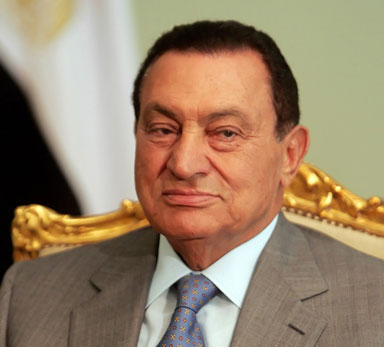Mubarak Reaffirms that after April 25 Egypt Will Increase the Process of Normalization, JTA, Feb. 8, 1982.
 Egyptian President Hosni Mubarak declared that after Israel’s withdrawal from the Sinai April 25, Egypt will increase the normalization of relations between the two countries.”After April 25, we will continue to build bridges of understanding and friendship with the Israeli people,” he told a luncheon at the National Press Club last Friday .”This policy is irreversible.”
Egyptian President Hosni Mubarak declared that after Israel’s withdrawal from the Sinai April 25, Egypt will increase the normalization of relations between the two countries.”After April 25, we will continue to build bridges of understanding and friendship with the Israeli people,” he told a luncheon at the National Press Club last Friday .”This policy is irreversible.”
The 53-year-old Egyptian President added that “in fact, the completion of Israel’s withdrawal from the Sinai will open the door for more interaction between Egyptians and Israelis. It signals the removal of another psychological barrier on the road to full peace.”
Mubarak, in his speech, the only major address of his four-day visit to Washington which ended Friday night, called the Palestinian problem the “core” of the Middle East conflict and again urged the United States to open a dialogue with the Palestinians.
He said that Egypt is committed to the Camp David peace process and will continue to promote “a negotiated settlement between Israel and all its Arab neighbors” as well as seek an autonomy agreement for the Palestinians on the West Bank and the Gaza Strip.
But Mubarak cautioned against rushing to come out with “a declaration of principles” on autonomy simply to say there is an agreement. “A bad agreement is much worse than no agreement,” he declared. He said that in order for an agreement to have “a chance of being implemented” it must be accepted by the Palestinians.
“We are not suggesting that we should seek their (the Palestinians) prior approval before we agree on a declaration,” Mubarak explained. “We are simply saying that all sides should bear in mind throughout the negotiations that their purpose is to attract other Arab parties to the peace process.”
Firm Commitment to Camp David
Mubarak’s remarks at the luncheon were similar to those he made earlier in the day to 25 American Jewish leaders with wham he met for an hour at Blair House. Both Edgar Bronfman, president of the World Jewish Congress, and Howard Squadron, chairman of the Conference of Presidents of Major American Jewish Organizations, said that Mubarak stressed to the Jewish group his “firm” commitment to the Camp David process as the only way to achieve autonomy and a comprehensive peace agreement. “There is no other road,” the Egyptian President was quoted as saying.
Squadron said that Mubarak maintained the same policy on the Palestinians as did his late predecessor, President Anwar Sadat. Mubarak believes the Palestinian problem should be solved in conjunction with Jordan through some kind of confederation. Squadron said that the one major confrontation during the meeting was over Jerusalem. He said that he stressed that the American Jewish community has strong feelings that Jerusalem should remain united under Israeli sovereignty.
Squadron said they did not argue the point because they were not there to negotiate but only to express their views on various issues. He said the Jewish leaders were “very favorably impressed” by Mubarak.
View of the Palestinian Issue
In his discussion of the Palestinians in his press club address, Mubarak said that before the Palestinian question appeared in the 1940s, “there was no dispute between Arabs and Jews” because “Moslems and Christians of the Middle East never had any problems coexisting with their Jewish neighbors.”
He said, therefore, the Palestinian problem has to be solved even though it can be done in stages. “This is the philosophy of the Camp David approach, which remains the most valid mechanism for a comprehensive settlement.”
“The starting point of such phased solution should be mutual acceptance and recognition. When we talk about mutual recognition, we have in mind the recognition of the rights and not institutions or organizations,” Mubarak said. Much of the second part of Mubarak’s speech was taken up with the need for development of Egypt and other Third World countries.
Mubarak spoke of Egypt’s hopes for increased United States economic aid, an issue that was a major focus of his visit here, his first since being elected President last October. When a question was raised about the high percentage of United States foreign aid that goes to Israel and Egypt, Mubarak replied that Israel is rich while Egypt is a poor country. He said that while he was not calling for decreasing aid to Israel, he hoped more aid would be going to Egypt.
Mubarak revealed that Egypt is sending arms and ammunition to Iraq to help Iraq fight its war with Iran but he said he would not send troops. He called for the two countries to solve their difficulties peacefully, declaring that they should “come to the end of the war,” adding that they should look to what war does to the peoples of their countries.



